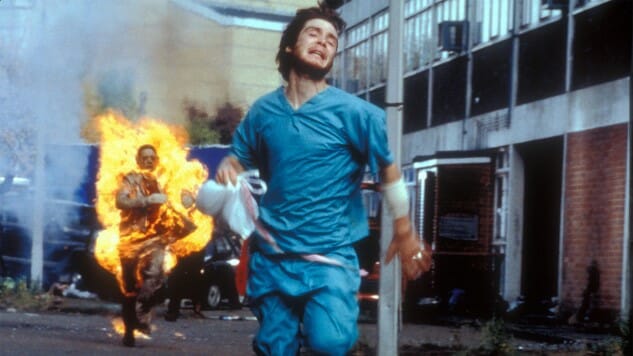The Forced Ambition of a 28 Years Later Film Trilogy

In modern Hollywood, simply bringing a blueprint for a successful motion picture to the table is nowhere near enough to actually get that film made. The promise of a potential hit movie? Insufficiently ambitious for the c-suite. If this project is going through a major Hollywood studio, we need to think bigger than that. We need shared universes; we need legacy sequel character appearances; we need not just one but multiple sequels lined up from the get-go, each ready to spin off into their own unending series. We need to build IP! Why even bother making a film, unless you can rattle off three or more of them? Who cares if this approach makes the actual films suffer, due to the way it almost can’t help but turn each into little more than an advertisement and justification for the next? Audiences, after all, have been so thoroughly trained to crave a steady drip of the familiar that surely they’ll simply beg for more of whatever they’re given, right? You’ll have to forgive the cynicism that has infected my frame of mind here, but it’s all I can think about when I imagine a project like director Danny Boyle’s upcoming trilogy of 28 Years Later movies.
Yes, a trilogy. A trilogy of zombie-adjacent films–because lest we forget, the “infected” of the series aren’t quite traditional, Romero-style undead zombies, though the structure of the movies are undeniably zombie cinema–that follow up on Boyle’s deeply influential 2002 original 28 Days Later, which was penned by writer-turned-director-of-distinction Alex Garland. Said trilogy will reunite the pairing in earnest (they worked tangentially but not directly on the lesser 28 Weeks Later), at least for the first film scheduled for June of 2025–the curiously titled second entry, 28 Years Later Part II: The Bone Temple is reportedly being helmed by Candyman director Nia DaCosta, although all three films will presumably have screenplays credited to Boyle and Garland. But still: Is this really a concept that demanded a trilogy of new movies, conceived and shot one after another? Is that decision likely to help each individual film stand on its own, or simply yoke them together like a team of plow animals hauling Columbia Pictures’ bottom line in the direction of lucrative merchandising opportunities? Was anyone clamoring for 28 Days Later to get the David Gordon Green Halloween trilogy treatment?
We have simply seen all too many recent examples of how this style of overly ambitious, franchise IP-building tends to turn inevitably toward vapid, creatively bankrupt results. From the era of Peter Jackson’s The Hobbit trilogy onward, this kind of excessive content-stretching has become cemented in the standard Hollywood playbook: Take an idea that might be compelling on its own, and then water it down and stretch it out to the point that it can no longer hold together and completely disintegrates before your eyes. We’ve seen it in aborted cinematic universes, from would-be auteurs like Zack Snyder and his pretentious, bloated Rebel Moon epic, or Green so losing control of the wheel in his Halloween films that he ended up somehow introducing a brand new central protagonist/antagonist in the third film of a trilogy via Halloween Ends, throwing aside the Strode women who had ostensibly been the narrative focus of the reboots. Thank God someone took the keys to The Exorcist away from the guy, rather than letting him swerve drunkenly through another two movies there as well.
Granted, Danny Boyle and Alex Garland are not David Gordon Green, as I imagine they would probably want someone to point out. And there are legitimate reasons for cautious optimism, when it comes to whatever they’re planning for 28 Years Later. Like most horror geeks, I have a soft spot for Boyle’s original, a lean and vicious film that upended so much rote zombie convention as it reinvented the format for the post-9/11 anxiety of the 2000s. I’ve written about 28 Days Later for Paste, and ranked it at #4 all time in the genre in our list of the 50 best zombie films of all time. Garland, for the record, has said in interviews that he conceived the entire trilogy at the same time, which one would think should at least lend it some kind of narrative cohesion–although Green said the same thing about his schizophrenic Halloween movies, so who the hell knows? They’ve certainly attracted plenty of talent; you can’t deny that–in addition to a returning-in-some-capacity Cillian Murphy, you’ve also got Aaron Taylor-Johnson, Jodie Comer, Jack O’Connell and Ralph freakin’ Fiennes of all people in the first 28 Years Later installment, which is about as good a foundation as one can hope for in your long-delayed zombie project. Perhaps Boyle feels hungry for a hit with potential blockbuster-type appeal, in his first film since 2019’s treacly Beatles jukebox fantasy Yesterday? It certainly reads as the most “widespread commercial appeal”-type project of Garland’s writing career, in comparison with the likes of Ex Machina, Annihilation, Men or even A24’s bombastically marketed but ultimately cloistered Civil War.
-

-

-

-

-

-

-

-

-

-

-

-

-

-

-

-

-

-

-

-

-

-

-

-

-

-

-

-

-

-

-

-

-

-

-

-

-

-

-

-









































